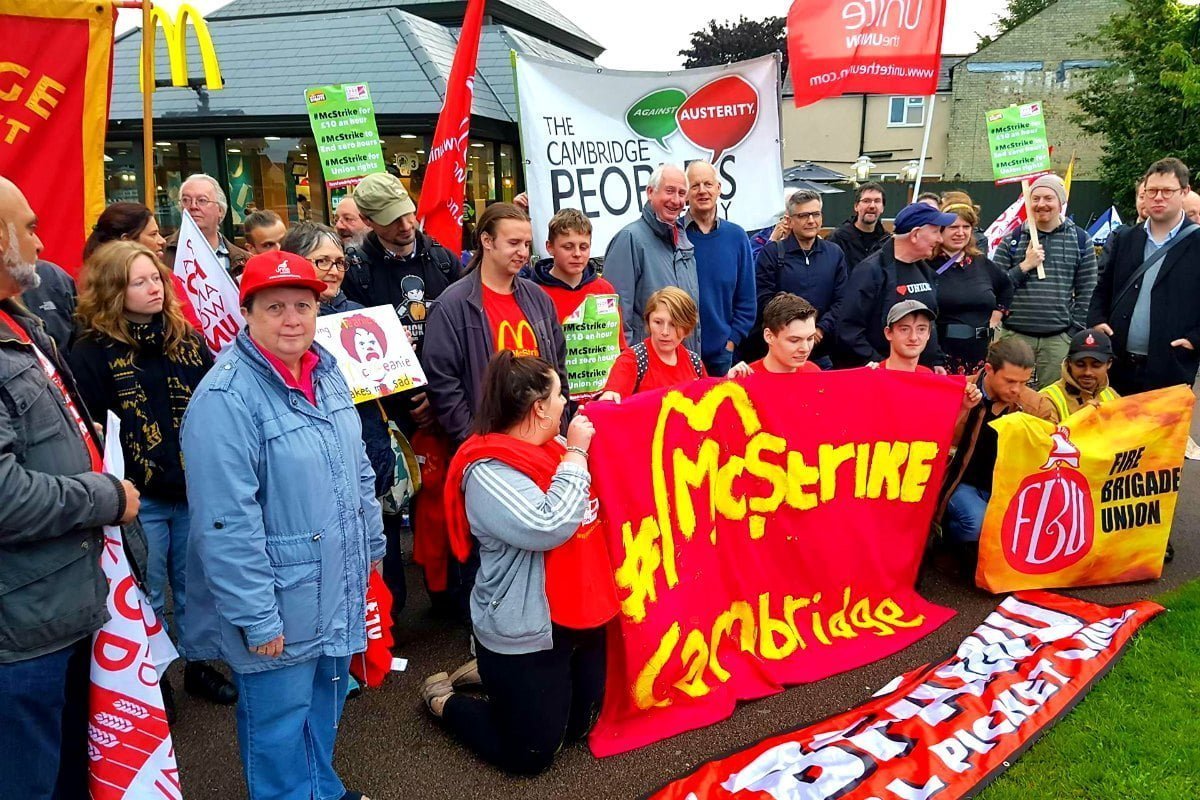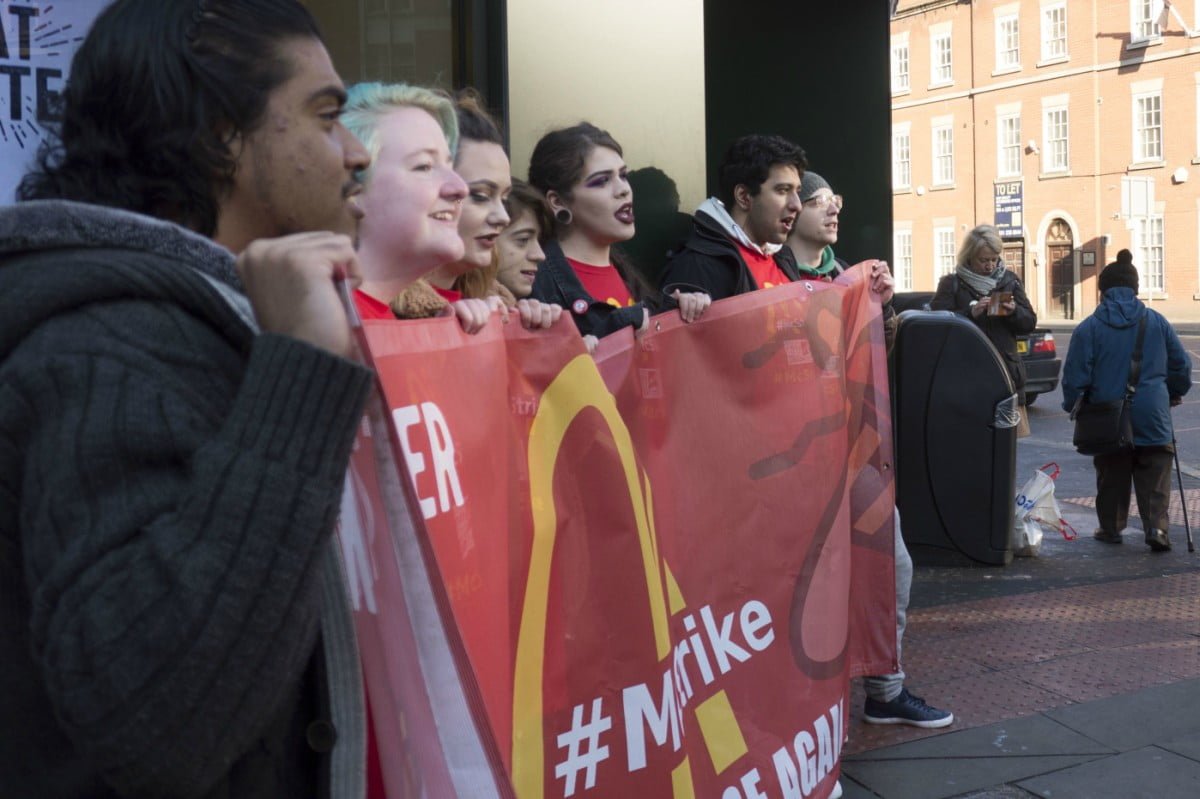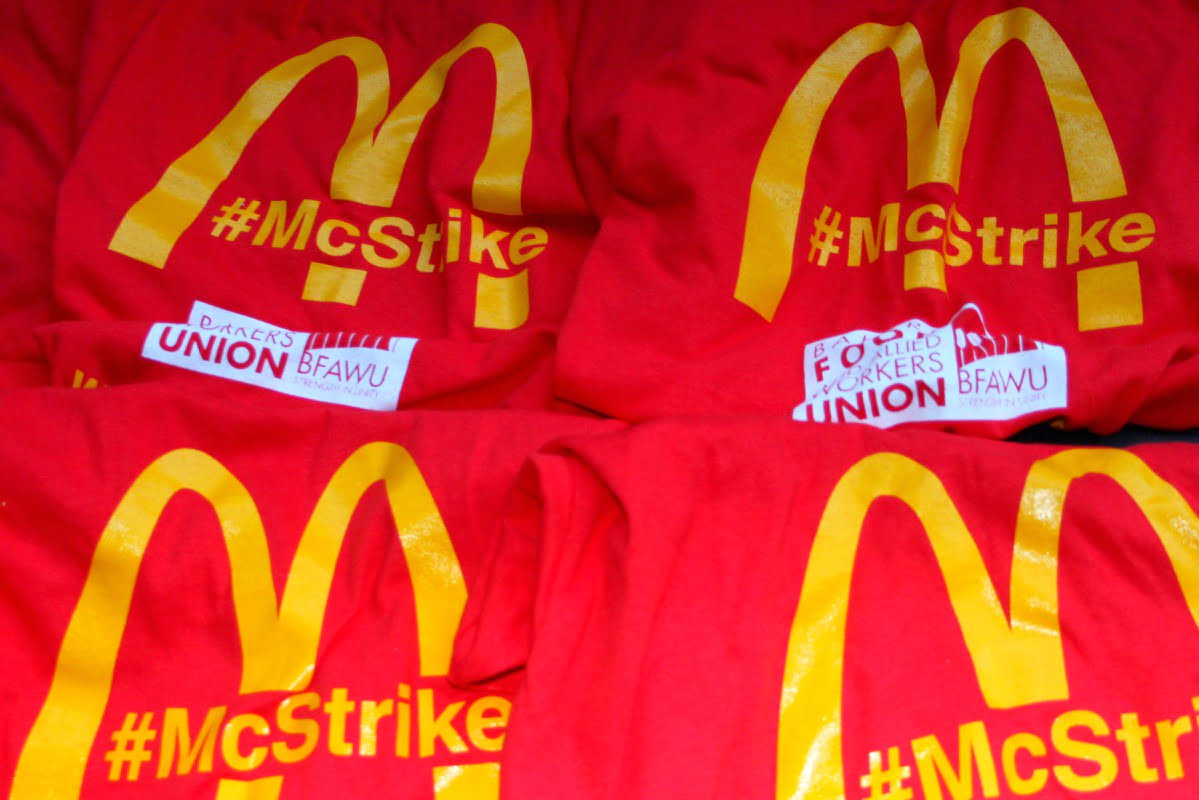McDonald’s workers celebrated 1st May by taking further strike action for decent wages and conditions.
On 1st May, International Workers’ Day, McDonald’s workers from five locations around the country went on strike.
The Cambridge and Crayford branches made history last September, displaying courage as they stood up to the bosses by taking strike action. Since then, the workers’ demands have not been met and the strikes have continued.
Despite pressure and bullying from management, the striking staff are standing firm and are refusing to buckle. At the demo in Watford, where four picket lines converged later in the day, the McDonald’s workers made it clear that they are striking to win.
The main demands made by the workers are: an end to zero-hour contracts; a £10 living wage; and union recognition.
The multinational fast-food corporation claims that they have made concessions by offering fixed-hour contracts. But these are not a reality for many workers, since staff have to have worked a certain amount of hours in the previous 12 weeks in order for them to become eligible for this more stable contract.
A McStriker at the Cambridge branch commented that this important caveat made the contracts unfeasible for many workers. It is clear that the newly-offered contracts are merely for show.
The unwillingness of this corporate giant to take seriously the genuine concerns of the workers reflects the rotten reality of capitalism. “McDonald’s should feel ashamed.” stated Joe, a striker on the Cambridge picket line.
“I can say from my experience that people are going through things that are not legal, that are wrong, that they do not deserve.”
“Last night I had one of my fellow workers telling me that he deserved to be seen as a human being.”
Inspire through action
After their first strike, the workers from the two branches involved were victimised by their bosses – given less hours and bullied for their involvement.
The only defence against the bullying and attacks of corporate management is for workers to take collective action. This is why the need to organise, unionise, and strike is so crucial.
In this case, in order to collectively fight for their demands of a £10 per hour wage and secure work, McDonald’s workers are joining the Bakers, Food, and Allied Workers Union (BFAWU).
Despite the attempts to weaken the movement, the McDonald’s strikes have been praised nationally and internationally. The example set by the courage of these workers will undoubtedly inspire other branches to come out and strike. Indeed, this process has already begun, with more locations seeing strike action this time round.
At the demo in Watford, workers travelling from Birmingham (who were not officially out on strike) spoke of how the movement had permeated conversation amongst underpaid, undervalued workers. They spoke about how future strikes will mobilise McDonald’s workers and branches in much greater numbers.
This is what the bosses everywhere will be afraid of: that these strikes will inspire other workers – including those currently unorganised – to take collective action against their conditions.
Striking for victory
 The workers are gaining more and more confidence in their own power. The slogan “I believe that we can win”, originating from the McDonald’s strikes in the USA, was chanted throughout the day. And it was worn proudly as a badge by all those who joined the picket in solidarity.
The workers are gaining more and more confidence in their own power. The slogan “I believe that we can win”, originating from the McDonald’s strikes in the USA, was chanted throughout the day. And it was worn proudly as a badge by all those who joined the picket in solidarity.
This confidence was reflected by the strength of the picket that gathered outside the McDonald’s branch in Newmarket Road, Cambridge. Gathered in support of the workers were trade unionists and students, making the picket a true expression of worker-student solidarity.
The mood of the McDonald’s workers is one of optimism. They are well aware of their value to the bosses. In numerous speeches given by strikers and union leaders, the conclusion was drawn: they need us – but we don’t need them!
At the Watford rally, the shadow minister for labour, Laura Pidcock, came in solidarity, giving a radical speech that highlighted who really produces the wealth in society. While CEO Steve Easterbrooks earns £5,500 per hour, the minimum wage that is paid to young workers is £5.75.
It is this exploitation of workers that is the source of the eye-watering wealth accumulated by the likes of Easterbrooks. It is also no surprise, therefore, that workers organising and agitating against this broken status quo are met with hostility by management – their demands for better wages are in opposition to the profits of the bosses.
The McDonald’s workers are conscious of the fact that it is from their labour and efforts that the corporate fat cats profit. The capitalists grab the lion’s share of the wealth that workers produce, whilst the workers themselves receive crumbs. But now the McStrikers are flexing their muscles, taking action, and fighting back.
The striking workers are right to be confident of victory. Workers across the globe have been winning concessions from the bosses, with the Fight for $15 campaign winning a major victory in Chicago, for example.
“Ever since the first strike I’ve been sharing my views with the other workers,” said Caleb. “They more or less support us. But some of them are a bit scared, or are not able to express themselves as much as I would.”
“The backing is there. We are not fighting on our own. Victory will be ours shortly.”
McStrike Manchester
Report by Lizzie Vazquez
 There was a good and uplifting atmosphere at the McDonald’s strike picket line in Manchester. Several striking workers spoke, along with union representatives.
There was a good and uplifting atmosphere at the McDonald’s strike picket line in Manchester. Several striking workers spoke, along with union representatives.
We spoke to Lauren McCourt, one of the workers out on strike. It is clear that she and her fellow workers have had enough of their exploitative employers. People out on the picket today were challenging the bosses and demanding a genuine living wage of £10 per hour.
More and more people – especially the young workers who make up most of McDonald’s staff – are no longer afraid of the prospect of fighting for change in society. Inspired by the McDonald’s strikes elsewhere in the country, this strike will go on to inspire other workers in similar jobs.
This signals a militant mood developing, as more and more people stand up to their exploitative employers and the capitalist system that maintains the power of bosses.
We stand in solidarity with the McDonald’s workers. The only way we can end this exploitation is by making a stand like this – and fighting for socialism!






